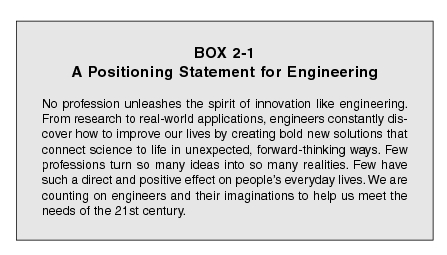Can Social Media Help Change the Public's Perception of the Engineering Profession?
The National Academy of Engineering has published a report called Changing the Conversation: Messages for Improving Public Understanding of Engineering. Given the importance of the engineering profession to US competitiveness and innovation, I’m hoping that the important research described in the report hasn’t overlooked the opportunities social media provide for engaging the public in the types of “conversations” the title of the report seems to promote.
The study was sponsored by the National Science Foundation with additional support from the Georgia Institute of Technology. It describes research and recommendations surrounding public communications to improve the image of engineers and engineering in American society.
The research is impressive and professionally conducted. The messages and themes that are tested with children high school students, and parents are well thought out. The resulting “positioning statement” that is recommended as the basis for communicating with members of the public is this:

But in one significant way the report disappointed me. The research was designed to develop a message that can be communicated to target audiences that is designed to create, over time, an impression that will eventually change behaviors with respect to decisions such as career decisions. It does that in a careful and methodical fashion and recognizes that different groups (e.g., young people and their parents) may need to be communicated with in different ways.
Yet the manner in which the messages are to be communicated with the public, as suggested in the Conclusions and Recommendations chapter, seem to focus for the most part on traditional, mass-market types of public relations based advertising communications. The focus seems to be, “We’ve developed a good understanding of the different types of messages that appeal to our target markets. Now let’s select the media and advertising channels that will get the message across to our target audiences.”
Years ago I might not have questioned this approach. Given the popularity and use of social media and social networking systems today, especially by young people, I wonder if the focus on a “broadcast message” type of campaign makes complete sense any more. In fact, if the research described in this report had been conducted with an eye on the types of media and systems now available for communicating interactively with the various “target markets” identified in the report, I’m wondering if the message described in the box above might even have been the same.
Of course, that’s “Monday morning quarterbacking.” I’ve managed large survey based research efforts and I know how difficult it is to change directions once one gets started. Still, I can’t help but think about the potential value of using social media and social networking techniques instead of the “traditional” PR techniques the report seems to assume.
For example, would there be a way to use social networking to improve communications between potential engineering students and potential role models? Having real people talk about real problems and real solutions in a conversational manner with different individuals and groups mightin some instances be more effective than broadcast advertising messages that are so easily ignored by media and technology savvy young people.
Either way, whether we are talking about traditional advertising and PR techniques, or more contemporary social media enabled communications efforts, the communication has the be viewed as honest and sincere.
As someone who does appreciate engineering and who has friends and family who are engineers, I hope that the research reported here does have a positive impact.
Copyright (c) 2008 by Dennis D. McDonald



